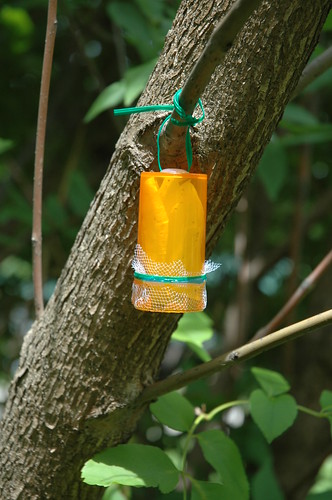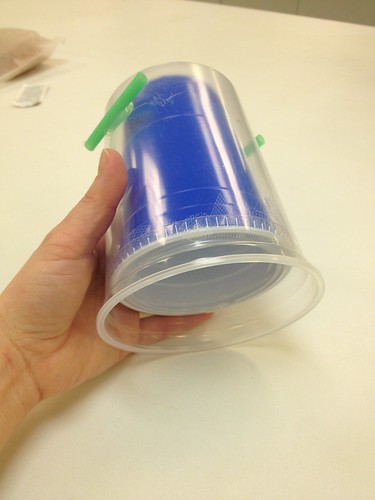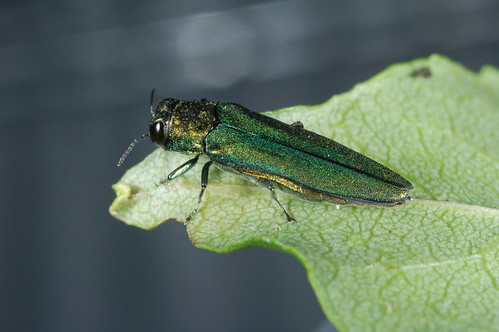
The streamlined design of Oobinator 2.0 improved the distribution of the wasps—each Oobinator containes 50 wasps that could be positioned at four distinct locations throughout the field site. Stingless wasps disperse in the field to search for EAB eggs that will serve as a host for its offspring.
Emerald ash borer (EAB) beetle is an invasive wood boring beetle, first detected in July 2002 in southeastern Michigan. The pest attacks and kills ash trees and it is responsible for the death and decline of tens of millions of ash in 25 states. EAB lives under the bark and when people move EAB-infested firewood they unknowingly move the pest. During EAB Awareness Week (May 22-28) leaveHungryPests behind and don’t move firewood.
Do you remember the eighties television show MacGyver? Science genius turns secret agent. Each week Angus MacGyver—armed with only a pen, aerosol spray can and a Swiss Army knife—successfully disarms the bomb and saves the day! The following week, it’s a shoe horn, jumper cables and a screwdriver…then a thermos, belt buckle….you get the drift. Sixty minutes of ingenious, nail-biting problem-solving.
Although the show’s final episode aired almost 25 years ago, the spirit of Angus lives on at the USDA’s Emerald Ash Borer (EAB) biological control production facility, where USDA is strategically rearing natural enemies to combat this destructive pest. Mass rearing biocontrol agents (stingless wasps) is a delicate process that’s time-sensitive, labor-intensive, and laden with problem-solving opportunities.
Case in point, the smallest wasp, Oobius agrili, which uses the EAB egg as a host and food for its offspring. This tiny crusader is comparable in size to the head of a pin. Now imagine needing to construct a shipping container to keep the wasps alive and safe while en route to EAB-infested areas, and a release system to allow the wasps to disperse and hunt for EAB eggs. Additionally, this all-in-one device needs to be low-cost, lightweight and easy to handle. Confronted with this challenge, USDA’s biocontrol facility staff channeled their ‘inner MacGyver’ to pioneer a solution.

The first generation of the Oobinator enabled the release of 200 or more stingless wasps at the field sites.
Armed with a clear plastic food container, Solo cup and top, drinking straw, tulle fabric and a hot glue gun, the staff improvised the first wasp shipping-container-release-system design. It worked and was promptly named, Oobinator.
While the Oobinator was a fully-functioning, autonomous biocontrol dispersal unit that was also recyclable, it was larger than it needed to be and a bit bulky. Not surprisingly, after a couple of years the biocontrol staff started thinking about how to streamline and improve the original pattern. This time, armed with a plastic medicine container and cap, twist ties, tulle fabric and a hot glue gun, the staff produced the next generation of the Oobinator.
The Oobinator 2.0 is substantially smaller and lighter than its predecessor. It ships in conventional commercial packaging and costs only .16 cents compared to the .67 cents of the original design—a savings of 76 percent. This year, the staff will assemble about 3,000 new Oobinators to supply over 130 biocontrol release sites with Oobius agrili—in Colorado, New Hampshire, North Carolina, Louisiana, Minnesota, and 15 other States with EAB infestations.
Undeniably, the EAB biological control facility benefits from a resourceful and creative team.
Along with this success, the staff has macgyvered numerous other tools and gadgets to improve outcomes, increase efficiencies, and deliver more stingless wasps to EAB-infested areas.
For more information about EAB Biocontrol, please visit: https://www.aphis.usda.gov/publications/plant_health/2014/faq_eab_biocontrol.pdf.

The emerald ash borer beetle.
No comments:
Post a Comment
Note: Only a member of this blog may post a comment.